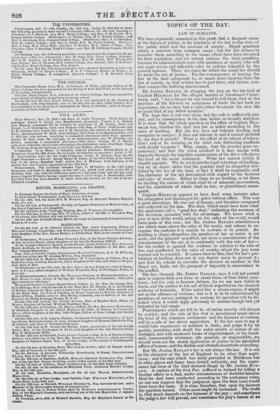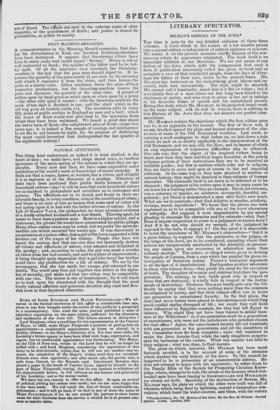TOPICS OF THE DAY.
LAW OF DUELLING.
WE have repeatedly remarked in this print, that a frequent cause of the failure of justice, is the blindness of the law to the state of the public mind and the customs of society. Illegal practices obtain a sanction from common usage ; but the law refuses to consider them according to the terms which have been invented for their regulation, and yet cannot enforce the strict penalties, because its-administration rests with members of society Who will not apply severe and inflexible rules to actions tolerated by the general opinion. There are cases for which the social law should be made the law of justice. For the consequence of leaving the law of the land antagonist to, or much more rigorous than the law of society, is, that neither has its just force, and vicious con- duct escapes the befitting chastisement.
Mr. Justice BAYLEY, in charging the jury on the late trial of Captain HELSHAM for the alleged murder of Lieutenant CROW- THER, said, " As a lawyer he was bound to tell them, that of the question of the fairness or unfairness of duels the law took no cognizance, for no man had a right either to expose his own life or assail that of any fellow creature."
The logic here is not very close, but the rule is sufficiently pre- cise, and its consequence in the case before us broadly manifest. It is clear that the whole question. in the affair of Captain HEL- SHAM was, whether the duel was fair or unfair according to the rules of duelling. But the law does not tolerate duelling and recognize its usages ; it does not tolerate it, and it cannot prohibit it, nor does it punish ! What is the effect of its refusal of tolera- tion ? and of its insisting on the strict rule forbidding conflicts with deadly weapons ? Why, simply, that the practice goes un- punished ; and that the worst conduct in it may escape with impunity throngh the impolitic maintenance of the law's rule above the level of the social sentiment. What law cannot forbid, it should regulate. We do not desire the legal toleration of duelling, but we do desire either that the practice shall be altogether abo- lished by the law of the land, or that it shall be cognizable, and the character of the act determined with regard to thelicences andrules of society. Either let there be no duelling, or let there be 'duelling the causes of which shall be of adequate provocation, and the conditions of which shall be -lir, or punishment conse- quent. Captain HELsirAm appears to have fired some instants after his, antagonist had discharged his pistol without effect. This was a reat advantage. He Was out of danger, and therefore composed and collected for the aim: His shot, which must have been what the marksmen call 'a "good line shot," 'indicating the accuracy of the direction, accorded with the advantage. .We know what a jury of men of the world, acting on the .rules of ,the world, would have made of this case ; but Mr. Justice BAYLEY administers a law which soars above the rules of the world, and refuses to re- cognize the customs it is unable to restrain or to punish. As duelling is illegal altogether, the question of fair or unfair is set aside, and the prisoner acquitted, not upon a consideration of the circumstances of the act, or in conformity i with the rule of law— for the verdict is against the evidence n relation to the rule of law, and unaffected by the rules of society, which the jury were warned not to consider. It comes theitto this, that the law's pro- hibition of duelling does not in any degree serve to prevent it; and that Its refusal to consider the manner of conduct in the illegal act, holds out the prospect of impunity to misconduct in the conflict.
The law, through Mr. Justice BAYLEY, says it will not permit men to expose their own lives or assail those of their fellow crea- tures; but the rule is brutunz fulmen, for we see men killed in duels, and the parties to the act of blood acquitted on the clearest -evidence of homicide. If law acted like a steam-engine, it might cut up the offences of custom' but as it is to be administered by members of society indulgent to custom, its operation will be de- feated when it would apply grievously to actions though bad yet tolerated by bad usage. Punishments which are felt to be of undue severity will always be evaded ; and the rule of law that is maintained much above the level of the common sentiments and the licences of custom, will be a rule of law above application. If the law were to say it would take cognizance of conduct in duels, and judge it by its quality, punishing with death the unfair stealth or seizure of ad- vantages, and with moderate terms of imprisonment, or the tread- mill, . unreasonable obstinacy, idle quarrels, or implacability, we should soon see the steady application of justice to the miscalled affairs of honour, and the decline and ultimate desuetude of duelling.
But DE:. Justice BAYLEY'S law is not always the law. It is not in the character of the law of England to be other than capri- Cious ; and the rule which has lately prevailed in Middlesex has in other places and times been denied authority, and the cogni- zance has been of the kind declared illegal by Mr. Justice BAY LEY. A captain of the 21st Fuz. suffered in Ireland for killing a brother officer in a duel, under circumstances of doubtful fairness. Had the duel been conducted according to the customary rules, no one can suppose that the judgment upon the fatal issue would have been the same. It is clear, therefore, that upon the fairness the-quettion turned. Other eases might be instanced. The truth is, that inuch depends on the-hutnour of the jrny ;.:andsometimes the judge's law will prevail, and sometimes the jury's. horror of an act of blood. The effects are seen in the extreme cases of utter impunity, or the punishment of death ; and justice is denied its graduations, so politic to society.



























 Previous page
Previous page